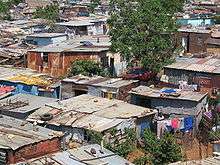Informal housing
Informal housing or informal settlement can include any form of housing, shelter, or settlement (or lack thereof) which is illegal, falls outside of government control or regulation, or is not afforded protection by the state.[1] As such, the informal housing-industry is part of the informal sector.[2]

To have informal housing status is to exist in "a state of deregulation, one where the ownership, use, and purpose of land cannot be fixed and mapped according to any prescribed set of regulations or the law".[1] While there is no global unified law of property-ownership[3] typically, the informal occupant or community will lack security of tenure and, with this, ready or reliable access to civic amenities (portable water, electricity- and gas-supply, sanitation and waste collection). Due to the informal nature of occupancy, the state will typically be unable to extract rent or land taxes.
The term "informal housing" is useful in capturing informal population other than those living slum settlements or shanty towns, which the UN Habitat defines more narrowly as "contiguous settlement where the inhabitants are characterized as having inadequate housing and basic services, often not recognized or addressed by the public authorities as an integral or equal part of the city."[4]
Common categories or terms associated with informal housing include: slums, slum settlements, shanty towns, squats, homelessness and pavement dwellers.
See also
- Affordable housing
- Informal sector
- Right to housing
- Subsidized housing
References
- Roy, Ananya (2009). "Why India Cannot Plan Its Cities". Planning Theory. 8 (1): 80.
- "The Informal Economy: Fact Finding Study" (PDF). Department for Infrastructure and Economic Cooperation. Archived from the original (PDF) on 27 October 2011. Retrieved 20 November 2011.
- Fernandes, Edesio; Varley, Ann (1998). Illegal Cities: Law and Urban Change in Developing Countries. London: Zed Books. p. 4.
- Cities Alliance: Cities without Slums (2002). Expert Group Meeting on Urban Indicators, Secure Tenure, Slums and Global Sample of Cities, Monday 28 to Wednesday 30 October 2002. Nairobi, Kenya: United Nations Human Settlements Programme (UN-HABITAT).
- Sassen, Saskia (2009). "The Global City – Strategic Site/New Frontier" in Dharavi: Documenting Informalities. Delhi: Academic Foundation. p. 20.
- "Pro-tenant laws in India often inhibit rental market". Global Property Law Guide. 20 June 2006. Retrieved 15 March 2012.
- National Building Organisation (2011). Slums in India: A Statistical Compendium. Ministry of Housing and Urban Poverty Alleviation (Government of India).
- Neuwirth, Robert. "Our Shadow Cities". TEDTalks. Retrieved 30 November 2012.
- Laquian, Aprodicio A. Basic housing: policies for urban sites, services, and shelter in developing countries (Ottawa: International Development Research Centre, 1983).